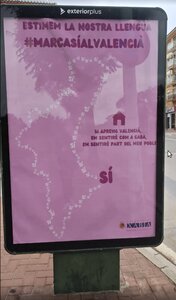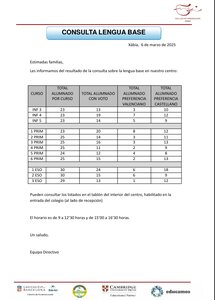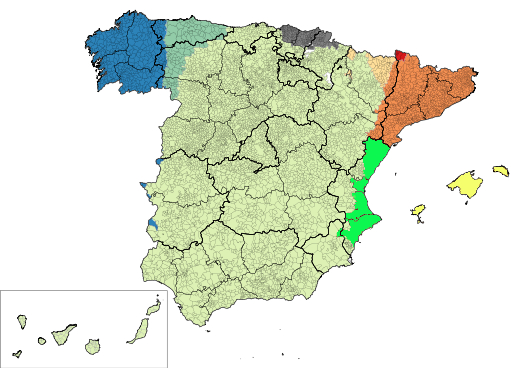50,53% / 49,47%
A draw or a victory for indoctrination?
March 8, 2025
The question at this „election“ was not: Who should decide on the language of instruction, politicians or parents? Instead, it was Valenciano versus Spanish and the parents were already the losers. But the intention was to distract from this and so it seemed as if languages had fought. El Mundo put it like this: „Valenciano wins by a narrow margin ... only in Alicante does Castilian prevail.“
The organisation Hablamos Español had warned early on about the massive indoctrination: „We have received complaints from families ... whose children came back from school with a booklet whose content was a crude indoctrination aimed at convincing families to choose Valenciano, regardless of their children's mother tongue, using errors and manipulations. It ignored the undeniable benefits of mother-tongue education, as advocated by the United Nations (UN) and recommended by all independent educators ... recommended.“
Given the massive indoctrination and the overwhelming majority1 of native Spanish speakers in Valencia, the percentage result (50.53% to 49.47%) and the low voter turnout (58.61%) raise some questions. 50.53% of 58.61% equals only 29.6% of 100% of eligible voters, not even a third.
More Valencian voters than speakers?
The Comunidad Valencia has three provinces. El País lists Valencian voters as 70.5% in the northern province of Castellon, 57.8% in the province of Valencia and 34.1% in the southern province of Alicante. A look at the German Wikipedia for the city of Alicante reads: „A 2008 study by the Valencian Ministry of Education found that only 2.9% of the city's population speak Valenciano at home, while 76.2% never speak Valenciano.“ It is certainly the case that more Valenciano is spoken in rural areas. But for all the lack of recent surveys and ambiguity on this issue, it remains: Why should the few pupils in the city of Alicante learn Valenciano at all, i.e. the compulsory 25%? Of course, this also applies in rural Castellon, where they may be in the minority.
Give the parents the right to choose and the children the opportunity to learn in their mother tongue without being forced to speak Valenciano. The problem would be solved. If the children's environment speaks Valenciano, they will be able to use it. Just like in German-speaking Switzerland, where all children learn Standfard German at school but speak their dialect at home. A dialect that most Germans barely understand, if at all.
But that's not what this article is about.
The government as manipulators
Next to the picture of the billboards that the government of Jávea, where I live, had put up everywhere. The government of Jávea is identical to two parties from the conservative government of the Comunidad Valenciana, the PP and VOX2. Before the elections to the Valencian government, they had promised to work in favour of the free choice of language of instruction by parents. As soon as they came to power, this demand was turned into a requirement for 25% Valenciano and the rest was to be decided by the parents. The picture opposite shows how the government wanted them to vote. Valenciano, of course.
In addition, corresponding brochures and flyers were also printed at taxpayers' expense and distributed at schools.
A government that tells voters how to vote did not even exist in the GDR (former East Germand) and Soviet Union.
Voter turnout below 60%. Why?
For the „election“ in the Comunidad Valenciana, according to El País: „In Castellón, 70.5% of families vote in favour (Valenciano), in Valencia 57.8% and in Alicante 34.1%, a province in which the Spanish language receives 65.9% of the vote. The turnout does not reach 60%“
This picture is also reflected at a public school (concertada), as can be seen in the adjacent image3. The question as to why more than 40% cannot decide in favour of a basic language, even at a public school, remains unanswered. It is important to realise that parents who send their children to such a school have considerably more financial and other expenses than at a public school. Are 40% of these parents not interested in their children? Hard to imagine.
Could it be that many parents did not go to the polls because they dared not speak out due to pressure from the government, town halls and the media, to the possible detriment of their children? Teachers, who are supposed to teach democratic behaviour to pupils, should actually have intervened against this massive election interference. There was no sign of this. When you know that musicians and doctors have already been sacked because they were unable to provide evidence of Valenciano, you ask yourself, is it any wonder?
Only the manipulators have another simple answer. For example, El Confidencial headlines: The result of the „election“ shows „a bilingual society with a desire to learn Valenciano“. If you don't have time to read much, all you understand is that people want to learn Valenciano. It would take some effort and precious time to realise that „the people“ do not even make up a third of those who voted in a mock election.
One realisation remains. A system,
* in which politicians can break their election promises with impunity and
* mainstream media uncritically parrot government speech
cannot be sold to me as democratic.
For me, many questions remain unanswered after this „election“.
Footnotes
1 In contrast to the German Wikipedia, which no longer provides information on language distribution in Valencia, the English Wikipedia lists: „Languages spoken at home: Valenciano use at home (always and more often): 31.8% and Spanish use at home (always and mre often): 58.8%" and refers to an official source from 2010. Chatgpt.com as so-called artificial intelligence lists "The native Spanish-speaking proportion in the Comunidad Valenciana is around 70-80%“
2 In Jávea, the Ciudadanos por Jávea (CpJ), also conservative, are also part of it.
3 Inf=Infantil = children under 6 years. Prim = Primary school up to 12 years and ESO from 12 years on
Total Alumnado por curso = Total number of parents per course
Total Alumnado con voto = total number of votes cast
Total Alumnado preferencia Valenciano = Total votes for Valeciano
Total Alumnado preferencia Castellano = Total votes for Spanish
| | | | Click here to subscribe or cancel your subscription |
Myths and deceptions of Catalan nationalism

Here you'll find the translation
Languages in Spain
Spanish, Basque, Catalan, Mallorquin, Valenciano etc.
The strategy of recatalanization
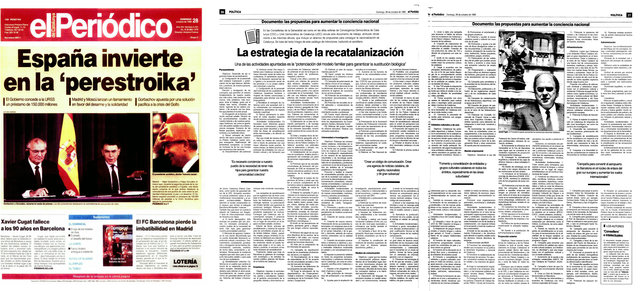 1980 the Spanish journal "El Periodico" published a secret document about the strategy of the Catalan government. It shows in a frightening way the actual spiritual world of the separatist leaders.
1980 the Spanish journal "El Periodico" published a secret document about the strategy of the Catalan government. It shows in a frightening way the actual spiritual world of the separatist leaders.Now it is available in english translation.
Pancatalanism
the separatist's imperial claim
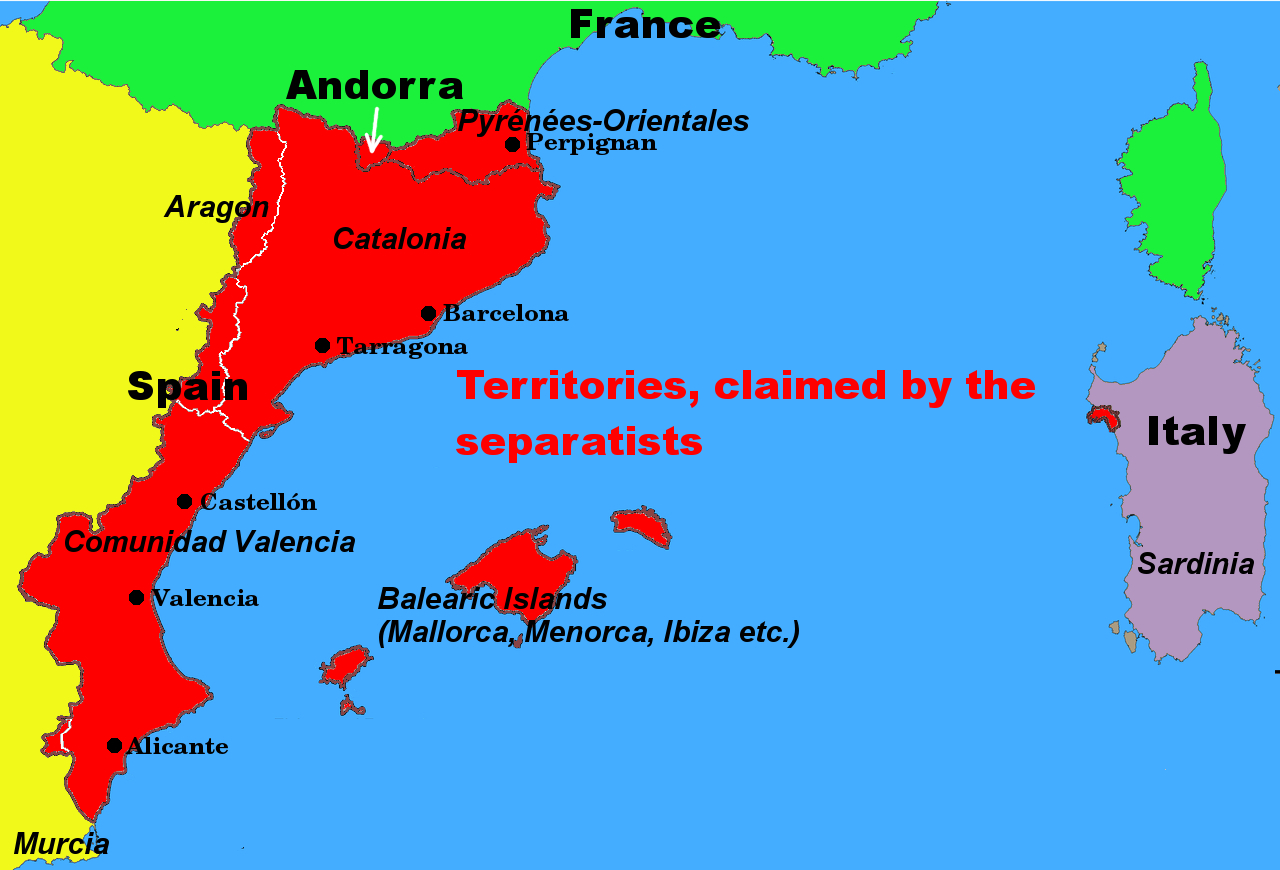 The Catalan government exports the conflict into communities with Catalan population, supporting all efforts of the separatists including financial means to destroy Spain.
The Catalan government exports the conflict into communities with Catalan population, supporting all efforts of the separatists including financial means to destroy Spain. An important tool is the establishment of a language dictatorship that is not afraid to use the same means as Franco.
Separatist indoctrination

Click here to read the study
Language imposition and democracy

An essay in 6 parts on the potentially violent effect of language imposition containing contributions from South Africa, Catalonia, Ukraine and France.
go to part 1 SticSti
Publications
 The title says: "Catalonia, a conflict is exported. Insights of a migrant"
The title says: "Catalonia, a conflict is exported. Insights of a migrant"Sorry, up to now, this book is only available in German. However, drop us a line, if you are interested to learn more Contact.

